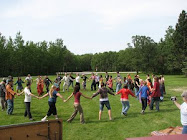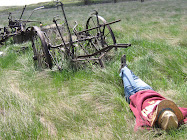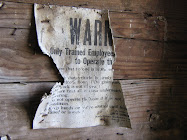© 2008 Karen Van Fossan
I haven't had a really good pet peeve for ten years. Maybe twenty. It's been a long time since I've let myself get full-scale annoyed by other people. Mostly, I just bumble along, getting annoyed with myself. But lately, that old annoyance is creeping back.
List of current pet peeves:
1) The rampant, free-flowing use of the term Founding Father.
OK. I guess I have only one pet peeve to date.
And before we go any further, don't get me wrong. I have been graciously hosted by the Father of Bluegrass Music in North Dakota. I've had my picture taken next to Mister Shelterbelt of the Great Plains' tree. Though I've never met the Fathers of Perfumery, Canadian Rodeo, Modern Sabre Fencing, the Yellow School Bus, Fourth Generation Warfare, or the Compact Disc, the Internet assures me their contributions have bordered on the extreme.
Honestly though. No matter what I'm told, I've always been pretty sure that history was (and is) full of women. Still, do I know who my mothers are? Not very many.
So, in case you're as pet-peevish as I am, I'll invite you to play a short game. Founding Moms. The object: Guess who said what and when. Are you ready?
1. The rights of the individual should be the primary object of all governments.
A) Franklin Delano Roosevelt in 1939.
B) Abraham Lincoln in 1860.
C) Mercy Otis Warren in 1805.
2. How long shall the fair daughters of Africa be compelled to bury their minds and talents beneath a load of iron pots and kettles?
A) Martin Luther King Jr. in 1968.
B) W. E. B. DuBois in 1909.
C) Maria W. Stewart in 1831.
3. Wall Street owns the country. It is no longer a government of the people, by the people, and for the people, but a government of Wall Street, by Wall Street, and for Wall Street.
A) Paul Wellstone in 2000.
B) William Jennings Bryan in 1908.
C) Mary Elizabeth Lease in 1890.
4. Establishing lasting peace is the work of education; all politics can do is keep us out of war.
A) Erik Erikson in 1969.
B) Jean Piaget in 1955.
C) Maria Montessori in 1949.
5. I want to be remembered as the person who helped us restore faith in ourselves.
A) Barack Obama in 2008.
B) Gordon Brown in 2007.
C) Wilma Mankiller in 1993.
Doesn't it feel good to have some Moms?
I'll admit, Founding Parents isn't catchy. It's only true.
(P.S. Click on the Comments for little-known facts on these Founding Moms.)
Sunday, October 26, 2008
Subscribe to:
Post Comments (Atom)






























5 comments:
Considered America's first playwright, Mercy Otis Warren corresponded and consulted with many of our famed Founding Fathers, including Benjamin Franklin, Thomas Jefferson, Samuel Adams, and John Hancock. She opposed the U.S. Constitution (unless a Bill of Rights was added), for which she had a falling out with John Adams. (They did make up eventually.) In 1805, she penned the most complete history of the American Revolution ever written, History of the Revolutionary War. In her lifetime, she never had the right to vote.
Maria W Stewart urged other free African-Americans (especially women) to join the struggle for equality and abolition in the 1830s, saying, "If they kill us, we shall but die." In a public oratory, she proclaimed, "Resistance to oppression [is] the highest form of obedience to God." She was a published writer and the first American woman (of any race) to lecture in public about politics. Like Mercy Otis Warren, however, she never had the right to vote.
Mary Elizabeth (AKA Mary Ellen) Lease agitated for Populist causes in the US in the 1890s. As a woman, she did not run for office herself, but she promoted the aims and campaigns of the Populist (People's) Party. Famous for urging farmers to "raise less corn and more Hell," her critics called her Mary Yellin; they claimed she could get a crowd shouting and stomping just by reciting the multiplication tables. Rumor has it that Ms Lease was the inspiration for Dorothy in The Wonderful Wizard of Oz by populist L. Frank Baum. She gained the right to vote 13 years before her death in 1933.
Maria Montessori revolutionized children's education along the philosophy that "children teach themselves." An Italian physician and scholar, she first specialized in working with children who were deemed uneducable; the first Montessori Miracle was declared when the children's test scores ranked above average. Her guiding principle became "Educate for Peace." In fact, she was exiled by Mussolini in 1934 because she refused to make soldiers of her students. Her fans and supporters included Alexander Graham Bell, Thomas Edison, and Helen Keller. In Italy in 1870, the year she was born, women did not have the right to vote; Ms Montessori did gain the right to vote before she died in the Netherlands in 1952.
Elected Chief of the Cherokee Nation in 1987 (and later reelected by a landslide), Wilma Mankiller is the first woman in modern history to lead a large tribal nation. As a young girl, she and her family experienced forced evacuation to California as part of the US government's Indian Relocation Program. A scholar and community activist, Ms Mankiller's major accomplishments as Chief included programs to reestablish traditional gender balance in community leadership. She has been inducted to the National Women's Hall of Fame and has received numerous awards, including the Presidential Medal of Freedom. A Wilma Mankiller fan, Gloria Steinem has said, "As long as people like Wilma Mankiller carry the flame within them, centuries of ignorance and genocide can't extinguish the human spirit."
How very interesting! I'm pretty sure these women were never mentioned in my history classes.
I love this!!
Well done, Karen.
Happy Almost Samhain to you, dear friend!
Louise,
You see, your tradition continues!
Much love,
K
Post a Comment